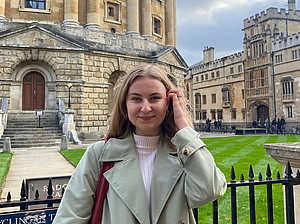Medieval History
Medieval History
The Department of Medieval History
Our department teaches and researches on the long period from around 500 to ca. 1500, and focuses primarily on the history of Latin Europe as well as the Orient and the Mediterranean region. This opens up a world that laid the foundations for modern European culture in many areas, but also appears fundamentally alien in many ways. Researching the history of the Middle Ages requires us to engage with a culture that often demands its own approaches and is not immediately accessible to modernity - and yet, in many areas of the modern world, uncovering medieval roots can help us to understand the present all the better.
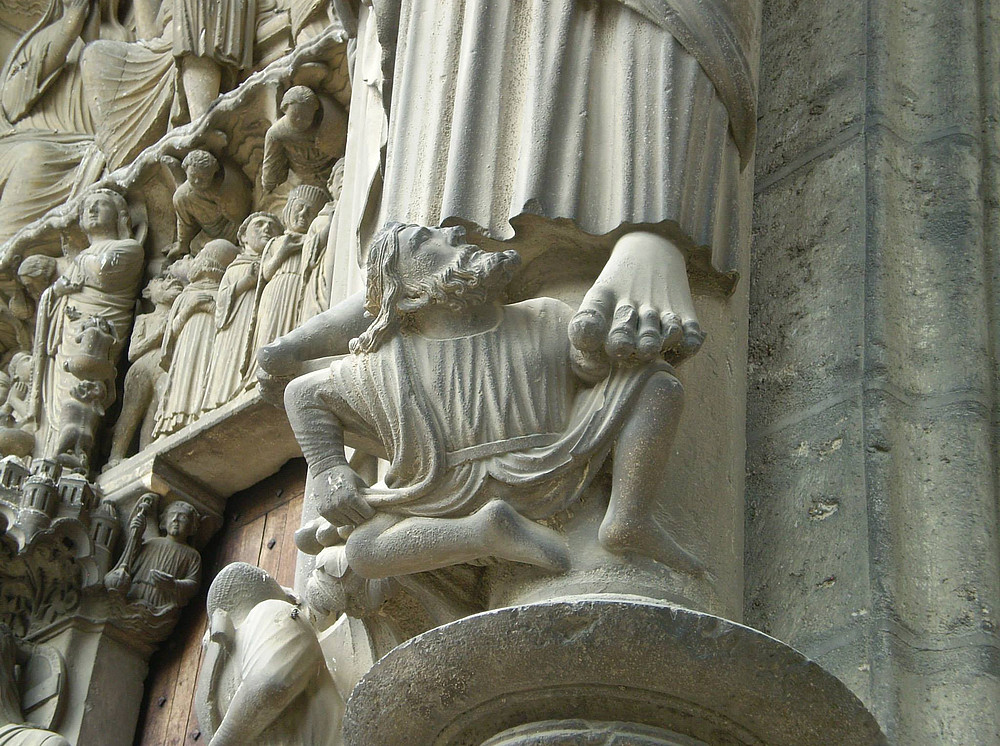
In Graz, medieval studies have been an integral part of the Institut für Geschichte since 1891. Since this point, our activities have focused on academic research and the comprehensive, career-oriented training of students. Our research focuses in particular on institutional history, women's and gender history, comparative religious and monastic history, cultural contacts between Europe and Asia, as well as national and regional history in the Danube-Alps-Adriatic region. Traditional focal points also include education and research in the field of material culture and the historical auxiliary sciences. These are the basic tools of the historian and provide an indispensable means to understand written and material sources, both from the Middle Ages and in modern times. They are to be understood as individual disciplines with their own methods, but have their own histories and developmental arcs. This broad group of subjects includes palaeography, diplomatics, epigraphy, realia studies, chronology, heraldry, sphragistics, numismatics, genealogy, codicology and historical geography. The department is also engaged in developing the teaching of medieval history in university and school contexts, as well as in adult education outside the university.
Especially for students of the Department of Medieval History: Notes on the organisation of academic papers in the Department of Medieval History

Research
The process of research involves the collection, organization, evaluation and communication of information about the past. It represents an ongoing process of enrichment, but also the critical examination of knowledge about the past.
Current research projects by Tanja Skambraks
Project "Kerbhölzer in the European Middle Ages. A contribution to the pre-modern history of administration and knowledge (500-1600)"
The project, designed as a monograph, combines material culture with the question of techniques of knowledge storage and administration in a European perspective in a long-term perspective between 500 and approx. 1600. The main sources are notched woods from the "European Northwest" (England, Scandinavia, Germany, Russia)." Legal history, administrative history and the history of knowledge are combined with the perspective of material culture research. By means of a comparative study and methodological impulses of material cultural studies, the specific formal and use-related characteristics and functions of the notched woods are worked out.
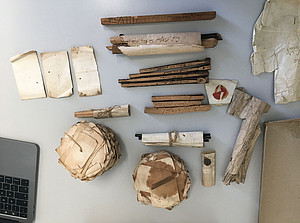
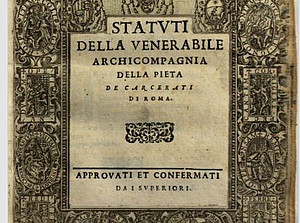
Project "Roman debt brotherhoods and social work in the 16th and 17th centuries"
How did pre-modern societies deal with over-indebted people? The project answers this question based on the history of two charitable municipal institutions for the care of the poor and debtors in Rome. The Arciconfraternita della carità and the Compagnia dei carcerati were both founded in the early 16th century with the aim of helping imprisoned debtors by obtaining deferments, paying off debts partly financed by donations and providing those released with a small amount of start-up capital. Their work could be compared to that of today's social workers. The history of these institutions will be analysed in two essays with regard to the question of the forms and institutionalization of urban social welfare.
Project "Municipal pawnshops and small loans in Nuremberg and Augsburg (15th to 17th century)"
This project ties in with the research topic of "small loans" and isolated works on municipal pawnshops in German-speaking countries and examines its characteristics using the example of the pawnshops in the cities of Nuremberg and Augsburg. Both foundations were modeled on the Italian Monti di Pietà in 1618 and 1603 respectively. Their hitherto largely unexplored history is closely linked to that of the Italian pawnshops.
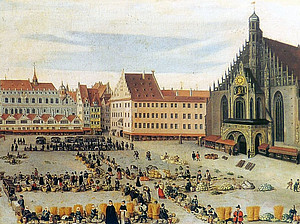
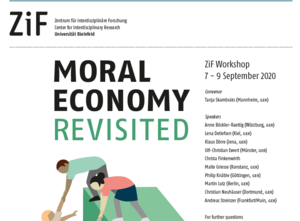
Project "Moral Economy" in a cross-epochal perspective
How do business ethics and ethical norms and values in general control and influence economic action in human societies in the long term? This research project follows on from the research field of economic history from the perspective of the history of ideas and economic ethics, but pursues a thematic and interdisciplinary opening.
Current research project by Günther Bernhard
monachus vagans eruditusque
Basic Historical Sciences/History of the Early Modern Period
Edition of the travel diaries of
Father Laurentius Doberschitz (1734-1799) from Kremsmünster
Head:
Ao. Prof. PD Dr. Günther Bernhard MAS
Associate Professor Dr. Marlies Raffler
- Project Laurentius Doberschitz
- Introduction (M. Raffler)
- Introduction Itinerarium parvum ( M. Raffler)
- Itinerarium parvum ( M. Raffler, G. Bernhard, S. Hofstadler)
- Map Itinerarium parvum ( S. Hofstadler)
- Introduction to journeys to Graz ( M. Raffler, D. Fandl)
- Journey to Graz in1789 ( D. Fandl, G. Bernhard, M. Raffler, S. Hofstadler)
- Journey to Graz in1791 ( D. Fandl, G. Bernhard, M. Raffler, S. Hofstadler)
- Map of the journey to Graz in 1789 and 1791 ( S. Hofstadler)
- Introduction Black Forest trip 1763(M. Raffler)
- Black Forest trip 1763 (A. Zellinger (Kleinpötzl), G. Bernhard, M. Raffler, S. Hofstadler)
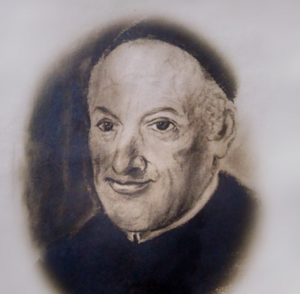
Further research projects
New edition of the "Urkundenbuch der Steiermark", Volume 2
Duration: since July 2013
Project manager: O. Univ.-Prof. i.R. Dr. Reinhard Härtel
Collaborator: Dr. Sabine Kaspar
Funded by: Historical Provincial Commission for Styria
Completed research projects
Project in cooperation with the Museum Schloss Bruck, Lienz
| Duration: | 2017-2018 |
| Staff members: | Anna Petutschnig BA, Elisabeth Tangerner BA |
Brief description:
The chapel of Bruck Castle in East Tyrol has numerous graffiti from the Middle Ages and the early modern period. As part of this project, they are being systematically recorded for the first time, edited and processed for presentation as part of the permanent exhibition at Bruck Castle.
Project in cooperation with the Università Ca' Foscari in Venice, Italy
| Duration: | 2015-2017 |
| Collaborators: | Univ.-Prof. Dr. Romedio Schmitz-Esser (as Visiting Researcher at the Università Ca' Foscari) |
Short description:
The account of Odorich of Pordenone's journey to India and China (14th century) is placed in the context of the strategies that supported the Franciscan mission to Asia in Europe, both financially and in terms of ideas. To this day, Odorich's sarcophagus and corpse, report and vita propagate both his veneration and the idea of Catholic world mission.
Sport, Prestige, Profit.
Historische Betrachtungen zum Run auf Ruhm und Reichtum
Walter M. Iber / Johannes Gießauf / Harald Knoll / Peter Mauritsch (Hg.)
(Stadion, Internationale Zeitschrift für Geschichte des Sports, Sonderband 3) Academia Verlag, 2024
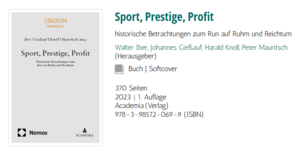
Skambraks, Tanja
Charitable credit. Monti di Pietà, Franciscan economic ethics and urban social policy in Italy (15th and 16th centuries) (= Vierteljahrschrift für Sozial- und Wirtschaftsgeschichte, Beihefte 259). Stuttgart. Franz Steiner. 2023.
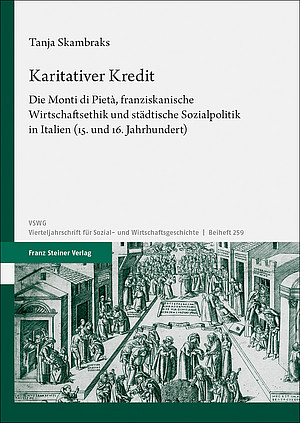
Skambraks, Tanja
Tally Sticks in Medieval Europe: Contexts and functions of a widely used accounting instrument .
In: Lucy Bennison-Chapman; ; (ed.): Book-keeping without writing. Early administrative technologies in context (PIHANS of the Netherlands Institute for the Near East Leiden CXXXIV). Leuven. Peeters. 2023. 179-199.
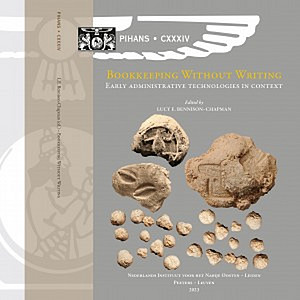
Skambraks, Tanja and Martin Lutz (eds.)
Reassessing the Moral Economy. Religion and Economy from Antiquity to the 20th century (Palgrave Studies in Economic History). London . Palgrave Macmillan. 2023.
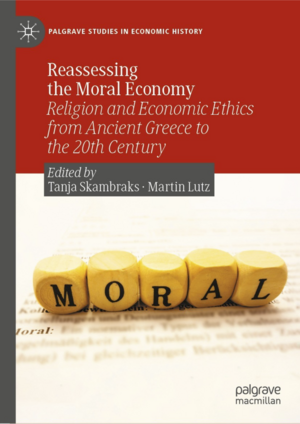
Skambraks, Tanja
Tally sticks as medial of knowledge in the contexts of medieval economic and administrative history.
In: Giampiero Nigro (ed.): L'economia della conoscenza: innovazione, produttività e crescitaeconomica nei secoli XIII-XVIII / The knowledge economy: innovation,productivity and economic growth, 13th to 18th century (Datini Studies inEconomic History, 3). Florence. Firenze University Press. 2023. 137-158.
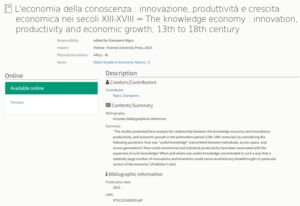
Research and public engagement
Invitation to the exhibition: A good life for all
(Living and) surviving in poverty in the Middle Ages and today
How does it feel to be on the margins of society – today and hundreds of years ago? The new exhibition in the foyer of the University Library of Graz is dedicated to the complex phenomenon of poverty and highlights strategies for survival and the unbridled struggle for independence across different eras.
This academic exhibition is the result of a special collaboration between the University of Graz (Medieval History Department), the University Library and Caritas Styria. A particular highlight are the contributions from students at the Institute of History, who present their latest research findings in the form of exhibition displays and audio stations.
What can you expect? Seven key themes are used to analyse the contrasts and constants of social hardship:
The daily struggle: Learn more about the struggle for food and shelter.
Faces of hardship: Historical data meets personal voices of the present.
Ways out of the crisis: From medieval welfare and pawnbroking to modern microloans.
Ethical questions: A look at alternative lifestyles such as ‘chosen simplicity’ and the economic reality behind sex work.
Come along and join the discussion! We cordially invite all students, teachers and interested members of the public to visit the exhibition and explore the topic in greater depth as part of our accompanying programme.
Exhibition dates: 5 March to 31 March 2026
Location: Foyer of the University Library Graz
Grand opening: 5 March 2026, 5 p.m. – with presentations by participating students and a talk on the ‘poverty kitchen’.
Accompanying highlight:
24 March: Panel discussion: ‘Experiencing poverty and understanding poverty. Perspectives from the past and present’ at 6 p.m. in the reading room of the University Library.
We look forward to your visit and an inspiring dialogue!
Online lecture series on basic sciences CURRENT
Tanja Skambraks is organising the online lecture series ‘Basic Sciences’ CURRENT. Six lectures on the basic scientific methods of medieval research.
Every Wednesday from 6:45 p.m. to 7:45 p.m. Via Zoom (see QR code).
Poster
IN VIRTUAL MUSEUM
From the drawer to the internet. It's easier than you might think. This online exhibition is the result of a master's seminar at the University of Graz in the winter semester of 2024/25. It shows a selection of seal impressions from the holdings of the Auxiliary Scientific Collection of the Medieval History Department. Under the direction of A.O. Prof. Dr Bernhard Günther and Univ.-Prof. Dr Tanja Skambraks, the students first compiled classic seal descriptions. They then used the free OMEKA programme to create an online exhibition on the respective seal bearers and their era.
Link: mittelaltersiegel.omeka.net/exhibits
Medieval Fencing Day
13 November 2025, 1:30 p.m., Location: UR 09.23 Heinrichstraße 26 II, 8010 Graz
Eric Burkart: Performative methods for researching medieval martial arts? A field report on digital humanities, critically reflected citizen science and videography.
Julia Bruch: Learning, Fighting, Surviving. Fencing in the 16th Century from the Perspective of the Fencers
Ute Bergner and Hannes Gießauf: Hans Czynner says: ‘Nym deyn schwert in pede hende’ – A fencing manuscript from the holdings of the University Library of Graz is presented
Phillip Harrer, Patrick Trummer, Nicholas Puffer: Praktische Fechtdemonstration.
Plakat & Exposé
Guest lecture
Chris Fletcher: “Political masculinities in tension: Gender and the state in England on the eve of the Hundred Years War”
08. Oktober 2025, 18 Uhr, Ort: UR 09.24 Heinrichstraße 26, 8010 Graz - Eine Kooperation der Arbeitsbereiche Kultur– und Geschlechtergeschichte und Geschichte des Mittelalters des Instituts für Geschichte.
Plakat
Conference “Material Culture”
Tanja Skambraks is organising the conference Economy and material culture in the Middle Ages – 12th annual conference of the Research Group for Late Medieval Economic History.
Graz, 24–26 September 2025, SR 15.41 RESOWI – Universitätsstraße 15 Bauteil A, 4. OG
Poster and programme
Object stories – students produce podcasts
What can we learn about the Middle Ages from objects?
Here you can see the results of the work of six students in the master's seminar ‘Object Stories’ from the 2025 summer semester, led by Prof. Dr. Tanja Skambraks. In podcasts lasting around 10 minutes, we tell you stories from history based on medieval objects that are now museum pieces. They include stabbing weapons, a musket, a globe, an astrolabe, a ship's grave and the Krämerbrücke bridge in Erfurt. Listen in and learn exciting facts about the Middle Ages, knowledge, trade, tournaments, funerals, medicine and the world view.
You can listen to all podcasts HERE:
Online lecture series on basic sciences
Tanja Skambraks is organising the online lecture series ‘Basic Sciences’. Six lectures on the basic scientific methods of medieval research.
Every Wednesday from 6:45 to 7:45 p.m. Unfortunately, the sixth lecture has been cancelled: AO. Univ.-Prof. Dr. MAS Günther Bernhard (Graz) on the topic: ‘Document landscapes in the Danube-Alps-Adriatic region.’
Plakat
Online lecture series on basic sciences
Tanja Skambraks is organising the online lecture series ‘Basic Sciences’. Six lectures on the basic scientific methods of medieval research.
Every Wednesday from 6:45 to 7:45 p.m. The fifth lecture will take place on 21 May 2025: PD Dr. Nils Bock (Munich) on the topic: ‘Ars heraldica. The world of medieval coats of arms.’
Plakat
Online lecture series on basic sciences
Tanja Skambraks is organising the online lecture series ‘Basic Sciences’. Six lectures on the basic scientific methods of medieval research.
Every Wednesday from 6:45 to 7:45 p.m. The fourth lecture will take place on 7 May 2025: PD Dr. Sebastian Steinbach (Liesborn) on the topic: ‘Liesborn (1904) and Börstel (1940) – New investigations into older treasure finds from medieval monasteries.’
Plakat
Workshop
Tanja Skambraks is participating in the workshop ‘Charity professionals and charity governance (XV-XIX centuries)’.
On 6 May 2025 in Bologna.
Programm
Online lecture series on basic sciences
Tanja Skambraks is organising the online lecture series ‘Basic Sciences’. Six lectures on the basic scientific methods of medieval research.
Every Wednesday from 6:45 p.m. to 7:45 p.m. The third lecture will take place on 23 April 2025: Univ.-Prof. Christina Antenhofer (Salzburg) on the topic: ‘From material culture research to material culture studies: new approaches to dealing with objects’.
Plakat
Conference ‘Tally Sticks’
Tanja Skambraks is organising the conference ‘Tally sticks: forgotten media of culture?’. International interdisciplinary workshop on the history of accounting, signs and writing.
From 10 to 12 April 2025 at the University of Graz, Universitätsplatz 3 EG, GEWI meeting room.
Plakat und Programm
Online lecture series on basic sciences
Tanja Skambraks organises the conference ‘Tally sticks: forgotten media of culture?’. International interdisciplinary workshop on the history of (ac)counting, signs and writing.
From 10 to 12 April 2025 at the University of Graz, Universitätsplatz 3 EG, GEWI meeting room.
Poster and programme
Online lecture series on basic sciences
Tanja Skambraks organises the online lecture series ‘Grundwissenschaften’. 6 lectures on the basic scientific methods of medieval research.
Every Wednesday from 18:45 to 19:45. The second lecture will take place on 09.04.2025: Roman Bleier MA PhD and Dr Bernhard Bauer (Graz): ‘Digital Editions in Medieval Studies’
Plakat
Excursion
‘Carinthia’ on 23-26 June 2025 with Tanja Skambraks (GSF.03506UB).
Registration at online.uni-graz.at and preliminary meeting on 3 April are mandatory.
Plakat
Online lecture series on basic sciences
Tanja Skambraks organises the online lecture series ‘Grundwissenschaften’. 6 lectures on the basic scientific methods of medieval research.
Every Wednesday from 18:45 to 19:45. First lecture is on 26 March 2025: Andreas Lehnertz (Trier): ‘The potential of medieval seals using the example of (not only) Jewish seals’
Plakat
Podcast with Jamie Page: Gone Medieval (part of the History Hit network) on the topic of sex work in the Middle Ages.
Jamie Page has recorded a podcast with his London colleague Dr Eleanor Janega. This episode explores the question of how to tell the story of prostitution for the Middle Ages from the perspective of the women involved, i.e. sex workers themselves. The episode is available at the link:
https://podcasts.apple.com/tn/podcast/gone-medieval/id1564113746
Lecture
Tanja Skambraks: ‘Life and Survival. Poor relief, microcredit and urban social economy in the late Middle Ages’
On 13 January 2025 at 7 pm in the AULA of the University of Graz - live broadcast at montagsakademie.uni-graz.at
Plakat
Online lecture
Jamie Page: Going to the Dogs: Masculinity and the “Waldmann Affair” of 1489
On 18 October 2024 at 4 pm
Plakat
Guest lecture
Annette Kehnel: Voluntarily poor - where can you find such a thing?
On 12 June 2024 at 10 a.m. in HS 62.01
Plakat
In conversation
Tanja Skambraks, Head of the Medieval History Department, talks about pawnbroking in the Middle Ages on SWR 2. You can listen to the entire radio interview via the link below.
In addition, the event Das Mittelalter im Film - Beitrag zur European Researchers Night 2022 took place on 30.09.2022.
at the St. Pölten UAS with Fritz Treiber and Johannes Giessauf.
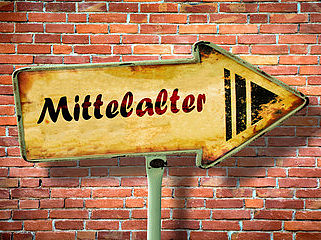
National and international meetings, conferences and lectures at a glance
11.12.2023-13.12.2023, University of Mannheim
Three-day workshop organized by Tanja Skambraks
Conference from October 14 - 16, 2022 at the Benedictine Abbey Admont. Organized by Cristina Andenna (University of Graz), Karin Schamberger, Proir P. Maximilian Schiefermüller (Benediktinerstift Admont) and Alison I. Beach (University of St Andrews).
Conference at the Ludwig-Maximilians-University Munich on 31 January 2020, organized by Richard Engl (Munich), Jan Keupp (Münster), Markus Krumm (Munich), Romedio Schmitz-Esser (Graz)
The conference of the International Historical Commission for the Study of the Teutonic Order, Vienna took place in Venice from October 8-10, 2018. Organized by Hubert Houben, University of Lecce, and Romedio Schmitz-Esser, University of Graz, in cooperation with the German Study Centre Venice.
Members of staff
Head of Department
University Professor Dr. Tanja Skambraks
Tanja Skambraks studied Medieval History, English and Communication Studies in Dresden and Edinburgh between 1999 and 2006. She moved to Mannheim for her doctorate on the Children's Bishop's Festival in Europe (2014), where she also completed her habilitation in 2021. Research stays and fellowships took her to Oxford, London, Boston, Rome and Perugia during her time in Mannheim. Her habilitation thesis was published in 2023 under the title: "Karitativer Kredit. Franciscan economic ethics and urban social policy in Italy (15th and 16th centuries)'. She has been researching at the University of Graz since September 2023 on various topics of social and economic history (microcredit, credit and banking, social work and poor relief), moral economy and material culture in a European perspective with a focus on the Mediterranean.
Link to a detailed curriculum vitae
Link to publications
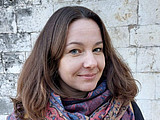
Univ.-Prof. Dr. Tanja Skambraks
+43 316 380 - 2245
Attemsgasse 8/IV
Raum 0026
8010 Graz
nach Vereinbarung per E-Mail
Associate Professor Dr. phil. Guenther Bernhard, MAS
Prof. Bernhard has been retired since 2 February 2026.
Studied History and Classical Archaeology at the University of Graz; dissertation under Prof. Dr. F. Hausmann on "The History of the Charterhouse Seiz in the Middle Ages" (doctorate 1988); 1986-1989 participation in the 58th training course of the Institute for Austrian Historical Research in Vienna; 1990-1997 (with temporary interruptions) freelance research assistant and project worker at the Research Institute for Historical Basic Sciences at the University of Graz; 1997-2000 employment contract with the FWF; 2000 contract employee at the FWF. Project assistant at the Research Institute for Historical Basic Sciences at the University of Graz u; 1997-2000 employment contract with the FWF; 2000 contract assistant at the Research Institute for Historical Basic Sciences; since 2002 full-time contract assistant at the Institute of History; 2008 habilitation in the subject "Historical Auxiliary Sciences"; 2017 habilitation in the subject "Regional History". Member of the Institute for Austrian Historical Research.
Main areas of research: Medieval imperial history, regional history in the Danube-Alpine-Adriatic region, basic historical sciences with a special focus on the Middle Ages and early modern period.
Link to publications

Ao.Univ.-Prof. Dr.phil. Günther Bernhard MAS
+43 316 380 - 1486
Heinrichstraße 26 III
Raum 0084
8010 Graz
nach Vereinbarung per E-Mail
Ass.-Prof. Mag. Dr.phil. Johannes Gießauf, MAS
Johannes Giessauf (*1968) Born, socialised and studied (history, ancient history, archaeology, ancient oriental studies and classical philology) in Graz, graduate and member of the Institute for Austrian Historical Research in Vienna, member of the Historical Commission for Styria, board member of the Centre for Military Studies. Long-standing member of the academic mid-level faculty representation and playing captain of the History/Mongolia football team.
Link to publications

Dr. Jamie Page
Jamie Page studied Medieval History and German in St Andrews, Scotland, from 2004 to 2008. In St Andrews, he also completed an MLitt (Mediaeval Studies, 2009) and a PhD (2013) under Prof. Frances Andrews and Prof. Bettina Bildhauer on the topic of prostitution in the German-speaking world in the late Middle Ages. From 2015 to 2018 he was a Leverhulme Early Career Fellow in Durham, England; he then went to Tübingen as part of the Teach@Tübingen program (2018) and was an Associate Lecturer in History in Lincoln from 2019 to 2020. In 2022 his first book was published, entitled Prostitution and Subjectivity in Late Medieval Germany (Oxford University Press). From 2021 to 2024 he worked as a school teacher in Birmingham, and has held a postdoctoral position in Graz since 2024, where he teaches courses on Angevin historiography and medieval masculinities. His current research project focuses on masculinity and political culture in the late medieval empire. His other research interests include sex work in history, microhistory, and crime in the Middle Ages.
Link to publications
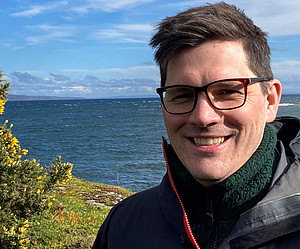
Dr. MMag. Barbara Denicolò, MA
Barbara Denicolò studied history, Latin and German language and literature in Innsbruck and then came to the University of Salzburg to do her doctorate. There she also took the interdisciplinary master's programme in Gastrosophical Sciences.
In 2023, she received her doctorate from Paris Lodron University of Salzburg with a thesis on cookbooks and recipe collections as discursive practices and sources for the cultural history of the late Middle Ages and early modern period. She is currently working on the court of Sigmund the Coin-Rich. In the summer semester of 2026, she will offer a seminar on historical recipe research and a VU on the Tyrolean princely court as an external lecturer.
Research interests: Tyrolean regional history, court history of the late Middle Ages and early modern period, food studies, materiality and cultural history, digital and public history.
Link to publications
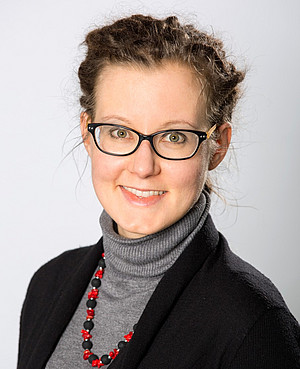
Secretariat
Brigitte Walter Mag.
Brigitte Walter has been working as an administrative assistant in the Department of Medieval History at the University of Graz since June 2021.
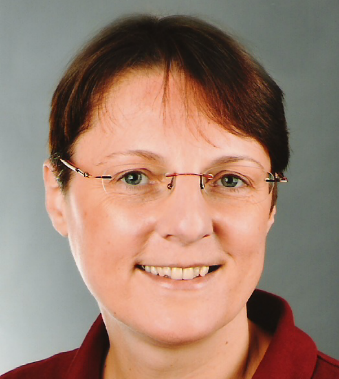
Student Assistant Stefanie Habernig
Stefanie Habernig is currently studying History and English/American Studies for her Bachelor's degree. She has been working as a student assistant in the Medieval History department since March 2025. She provides support, for example in the realisation of projects or in teaching by holding tutorials.
She is particularly interested in the topic of female visibility in medieval sources and spirituality in the context of everyday history, which is why she is focussing on the topic of female mysticism in her Bachelor's thesis.

Studienassistenz Alina Kladnik
Alina Kladnik is studying history and English/American studies as an extension subject for her bachelor's degree. She has been working as a student assistant in the Medieval History Department since January 2026, supporting the team in teaching, research and administration.
She is particularly interested in English history and issues of gender and cultural history, which is why her bachelor's thesis will focus on the role of female actors at the court of the late medieval Tudor king Henry VII.
